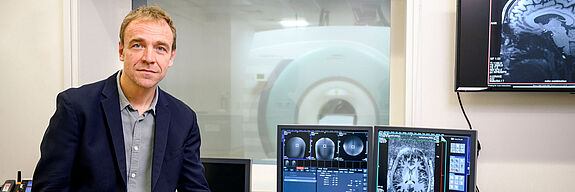Areas of investigation/research focus
The research group MR Physics investigates novel medical imaging methods for preclinical biomarkers of neurodegenerative diseases. The early detection of neurodegenerative diseases using medical imaging techniques is a challenging and still unsolved task. Nevertheless, Magnetic Resonance Imaging (MRI) is the method of choice due to its inherently multi-modal character: MRI exploits many different biophysical and biochemical properties and provides quantitative information for brain tissue characterization. Furthermore, the noninvasive nature of MRI offers a great opportunity to perform large-scale longitudinal studies in patient groups as well as in healthy volunteers. However, it is very difficult to detect small changes in brain tissue, as they occur in neurodegeneration.
Our main focus is the MRI sequence development on a new state-of-the-art 7 Tesla human MRI scanner, allowing the manifestations of neurodegeneration to be probed with high sensitivity and resolution. The higher sensitivity of ultra-high magnetic field MRI brings the opportunity to detect subtle changes in brain function, structure, and metabolism as known to be present in early stages of neurodegenerative diseases. The accompanied challenges of ultra-high field MRI are an active and important area of basic physics research.
Another major integral part of our work is the scientific support of high-throughput and high-quality neuroimaging at clinical 3 Tesla MRI scanners in the context of large-scale patient and population studies. The MR Physics group developed novel fast imaging techniques in collaboration with population science and clinical science at the DZNE. We developed the one-hour imaging protocol of the Rhineland Study which is now utilized in the main study. It includes novel acquisition methods for anatomical brain images, functional connectivity, structural connectivity, and imaging of vasculature. Additional, one of several contrasts, such as brain perfusion or macromolecule quantification, is obtained in a free protocol. The newly developed methods are additionally applied in studies together with partners from DZNE clinical science and international collaborators.

